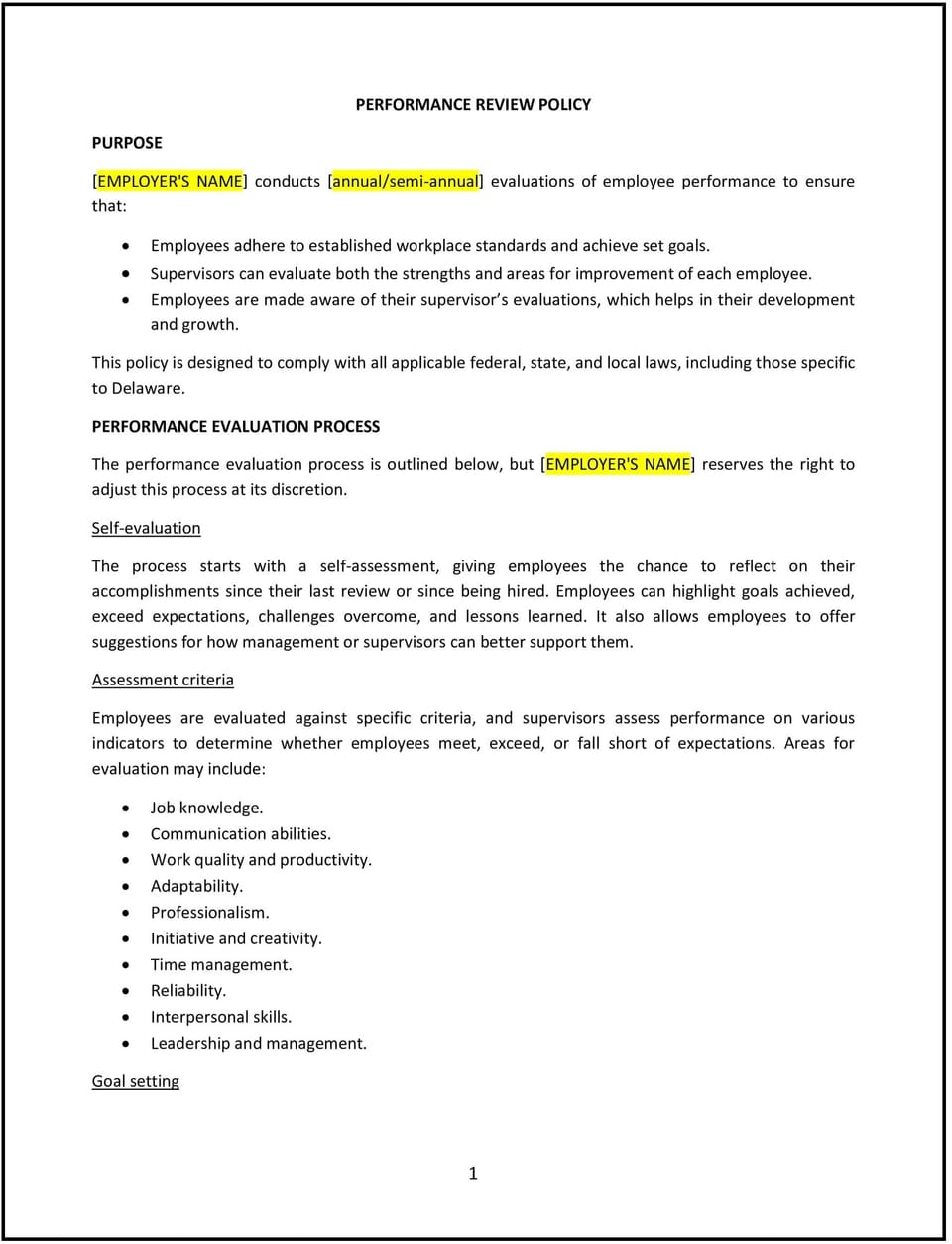Performance review policy (Delaware): Free template

Performance review policy (Delaware)
A performance review policy helps Delaware businesses establish a consistent framework for evaluating employee performance. This policy outlines the purpose, frequency, and procedures for performance evaluations to ensure fairness, support employee development, and align individual contributions with business goals.
By implementing this policy, businesses can enhance productivity, promote accountability, and foster professional growth while maintaining compliance with Delaware labor laws.
How to use this performance review policy (Delaware)
- Define review frequency: Specify how often performance reviews will take place, such as annually, semi-annually, or quarterly, depending on business needs.
- Establish evaluation criteria: Provide clear metrics and benchmarks for assessing performance, aligned with job responsibilities and company objectives.
- Outline the review process: Detail the steps involved, including self-assessments, manager evaluations, and review meetings to discuss feedback.
- Provide constructive feedback: Emphasize the importance of offering actionable insights to help employees understand strengths, areas for improvement, and goals.
- Set development plans: Include a process for creating personalized development or improvement plans to align employee growth with company objectives.
- Ensure confidentiality: Highlight that performance review information will be handled securely and shared only with relevant personnel.
Benefits of using this performance review policy (Delaware)
This policy offers several benefits for Delaware businesses:
- Enhances productivity: Provides employees with clear expectations and feedback to improve their performance.
- Promotes fairness: Ensures a standardized approach to performance evaluations, reducing bias or favoritism.
- Aligns goals: Helps align individual performance with overall company objectives to drive business success.
- Supports employee development: Encourages professional growth through constructive feedback and personalized development plans.
- Reduces legal risks: Ensures compliance with Delaware labor laws by documenting performance evaluations and related decisions.
Tips for using this performance review policy (Delaware)
- Communicate the policy clearly: Ensure employees and managers understand the purpose and process of performance evaluations.
- Train managers: Provide training on how to conduct fair and effective performance reviews, including giving constructive feedback.
- Use consistent tools: Standardize forms or software to ensure uniformity and accuracy in evaluations.
- Encourage two-way feedback: Create opportunities for employees to share their perspectives and discuss their career goals during reviews.
- Review regularly: Update the policy as needed to reflect changes in Delaware labor laws, company objectives, or industry standards.
Q: Why is a performance review policy important for my business?
A: This policy ensures consistent, fair evaluations, supports employee development, and aligns individual contributions with company goals, driving overall productivity and success.
Q: How often should performance reviews be conducted?
A: Reviews can be conducted annually, semi-annually, or quarterly, depending on the company’s needs and goals, as specified in the policy.
Q: What should managers focus on during performance reviews?
A: Managers should provide constructive feedback, recognize achievements, identify areas for improvement, and discuss goals to help employees align with company objectives.
Q: How can my business ensure fairness in performance reviews?
A: Use standardized evaluation criteria, provide manager training, and encourage two-way feedback to ensure a fair and transparent process.
Q: How often should this policy be reviewed?
A: This policy should be reviewed annually or whenever Delaware labor laws or company performance management practices change to ensure continued compliance and relevance.
This article contains general legal information and does not contain legal advice. Cobrief is not a law firm or a substitute for an attorney or law firm. The law is complex and changes often. For legal advice, please ask a lawyer.


